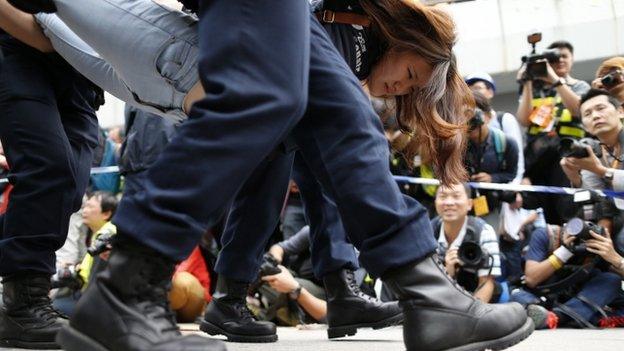Hong Kong protests: Has Beijing won?
- Published
- comments
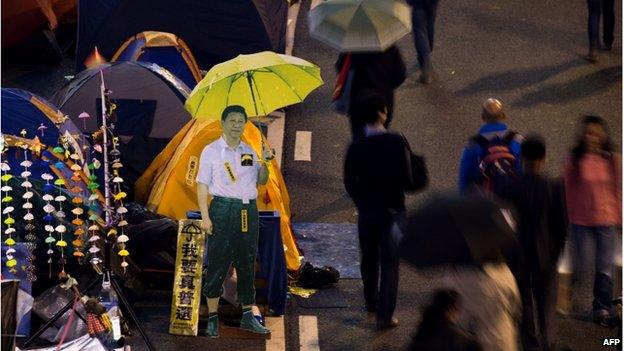
Protesters erected a cut-out of China's President Xi Jinping in Admiralty, before the site was cleared
Some say Xi Jinping has won in Hong Kong. I doubt if that's how he sees it.
As he watches pictures of traffic flowing through the heart of Admiralty today, he will certainly feel relieved that he didn't lose. But he is fighting a multi-level multi-player game. He has merely survived a level.
This is not to say he didn't play adroitly.
By leaving the protests to burn out amidst their own divisions and the weariness of the wider Hong Kong public, he deprived the umbrella movement of the oxygen of repression and demonstrated that Beijing's tool kit for dealing with citizen defiance runs beyond tanks or truncheons.
What's more, he made no concessions. The lesson that Beijing does not bow to pressure was delivered not just to Hong Kong but to the world.
But the only real victory Beijing can claim in the entire episode is not in Hong Kong but at home on the mainland where, barring a few brave souls who raised their voices on behalf of Hong Kong democracy, little stirred.
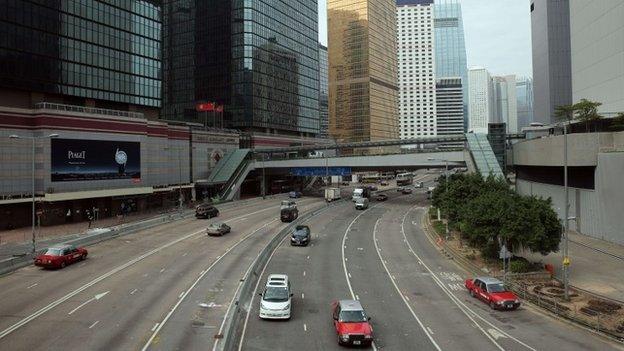
The main thoroughfare in Admiralty is now open to traffic, with hardly any traces of the protest camp
This is an important victory for the propaganda machine, which successfully presented the protesters as a mix of spoilt children narrowly pursuing their own interests at the expense of the public good, and cunning enemies of the state in league with foreign forces.
"Any person who cares about Hong Kong and about the people of Hong Kong should say 'NO' to this hijacking of the general public will for personal objectives," said the Communist Party flagship newspaper, the People's Daily.
Champions of democracy everywhere take note - the aspirations of the young protesters of Hong Kong did not immediately resonate with their counterparts on the mainland.
Despite being beneficiaries of globalisation and despite having ever greater contact with the West through university education and holidays abroad, many young Chinese are suspicious of idealistic political messages.
Since childhood, they have been exposed to a historical narrative which dwells on China's humiliation at the hands of foreigners.
Many now echo their government's suspicion of street protests, social chaos and foreign ideas peddled by people whose hidden agenda may be to divide China and keep it down.
According to China's best known military theorist, Sun Tzu (writing two-and-a-half thousand years ago), the best kind of victory is won without fighting.
Seeing the mainland stable throughout two-and-a-half months of street protest in Hong Kong is just such a victory.
But provoking thousands of citizens onto the streets in the first place is, by the same token, no kind of victory at all. Beijing brought the umbrella movement on itself.
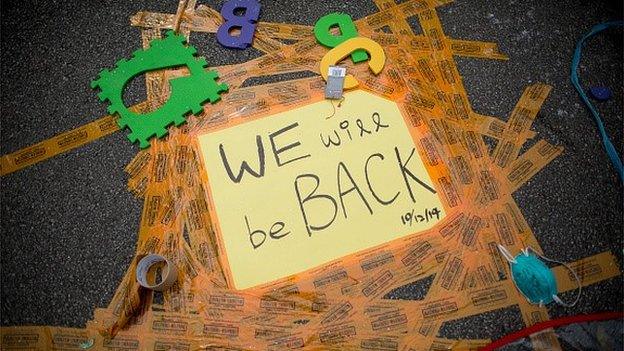
Protesters have vowed to continue with their campaign
With its white paper in June and electoral arrangements in August, it made clear that it would not only draw up a narrower political board game in Hong Kong but control the pieces too.
Hong Kong citizens were already resentful of the scale of mainland tourism and immigration, and the young alienated by a growing list of frustrations including impossible property prices.
In this combustible mix, Beijing's announcements were the proverbial sparks that lit the prairie fire.
Sun Tzu would have called this self-inflicted injury. The electoral arrangements were intended to avoid future challenges from an elected Hong Kong leader. But instead they provoked a very present challenge from at least 100,000 citizens.
For a government which likes to reinforce the impression that it is in charge of not just the staging but the script, Hong Kong was an uncomfortable discovery that the props can get up and misbehave.
Ever since Chairman Mao's ideological experiments resulted in the deaths of countless millions in the 1950s and 1960s, China's Communist leaders have insisted that they believe in "seeking truth from facts".
The sobering fact in relation to the Umbrella Movement is that a generation of young people in Hong Kong is increasingly politicised and alienated from China.
With their demand for democratic rights, the members of the umbrella movement effectively rebranded themselves "not China".
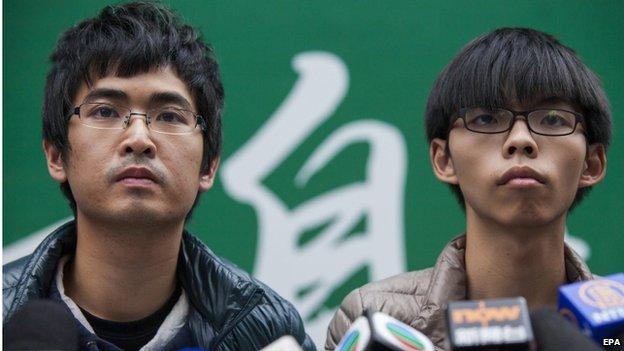
Alex Chow (L) and Joshua Wong (R) are two prominent Hong Kong student leaders who have led the protests
The same is true in Taiwan.
Despite all of Beijing's efforts to coax the island towards reunification, the message from recent local elections as well as from the Sunflower Movement in the spring is that the Taiwanese public and especially its young people, are moving in the opposite direction.
Far from assimilating easily to an increasingly wealthy China, Hong Kong and Taiwan are growing more defiant. And adding to the list of troublesome peripheries whose citizens can't be trusted to behave like true Chinese patriots, let's not forget Xinjiang.
So while Xi Jinping will go on talking up his China Dream and urging the young people of China to unite behind it, he must have realised by now that his message is struggling with key audiences.
Hong Kong has seen a generation of young people devote energy, passion and sacrifice into a competing dream. These are people he needs on his side. Xi Jinping may not have lost in Hong Kong, but he needs to do much, much more if he is going to win.
- Published12 December 2014
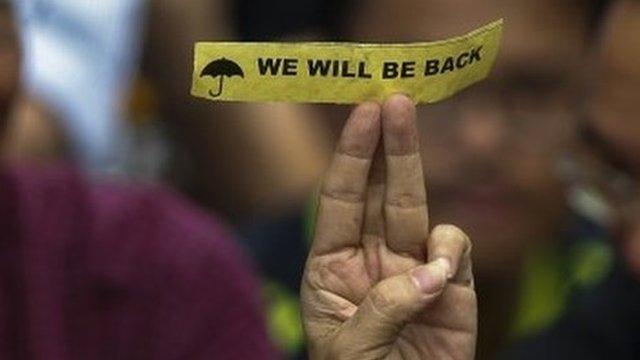
- Published11 December 2014
